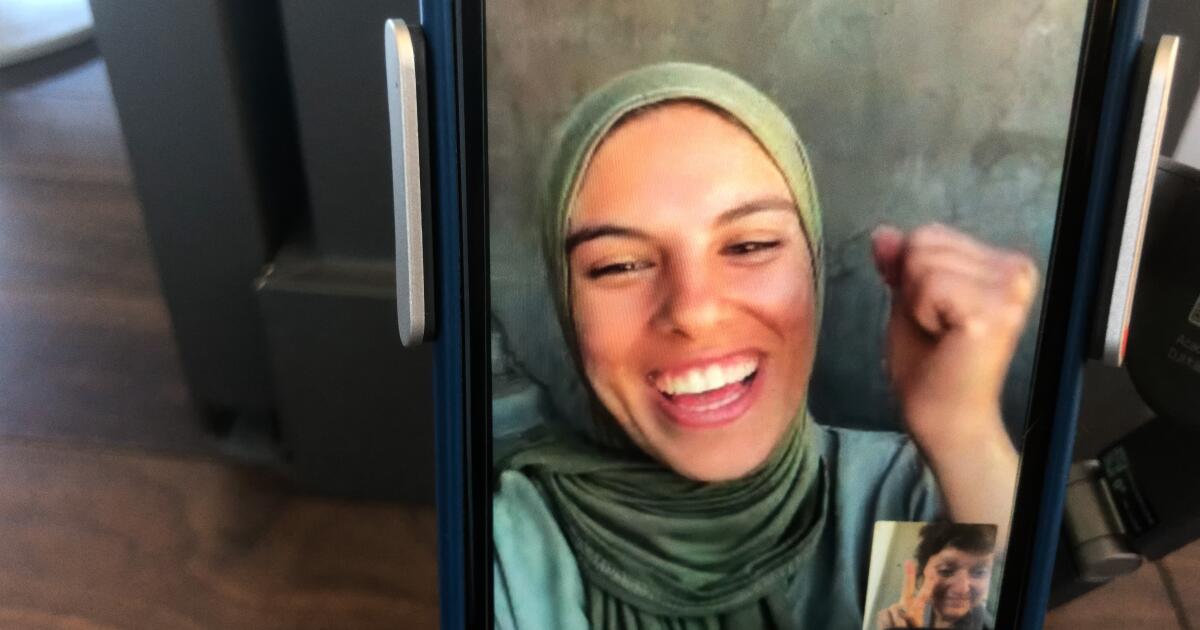‘Put Your Soul on Your Hand and Walk’ review: A Palestinian poet brings hope
Stories will long be told about what Gazans have endured these last couple of years, and movies will be part of that unburdening. This spring, Iranian filmmaker Sepideh Farsi believed she would be unveiling a uniquely dignified portrait of one Palestinian woman’s experience when the Cannes Film Festival accepted her documentary “Put Your Soul on Your Hand and Walk,” which comprised her year of spirited video chats with positive-minded 25-year-old photojournalist and poet Fatma Hassona. The day after the Cannes news, Hassona and her family were killed by an Israeli missile.
It’s not unheard of for a completed movie to become something entirely different overnight. But what’s quietly miraculous about “Put Your Soul on Your Hand and Walk,” considering its added tragic weight, is what the force of Hassona’s personality and Farsi’s filmmaking choices still manage to do: speak to what’s ineffably beautiful about our human capacity for hope and connection.
In her opening narration, Farsi explains how she’d been looking for a way into Gaza to understand it beyond the media reports. Physically, that proved impossible, but through a refugee friend, she was connected to Hassona in April 2024. In their first video call, which Farsi, then in Cairo, recorded with a separate smartphone, Hassona’s beaming face immediately dispels any notion that all Palestinians must exist in a defeated state amid relentless bombing. Asked how she feels, Hassona — who had just witnessed a huge explosion the day prior — says, “I feel proud.” With unforced lightness, she assures Farsi that they will continue to live their lives and laugh, that they are “special people.” She knows every day is about actively not letting themselves get used to it. The documentary’s title is Hassona’s description of what she does when she leaves her house.
You believe her. That high-wattage smile registers as whatever the opposite of a bomb is. But it’s also easy to notice Farsi’s ingrained cynicism about the state of things, having once been imprisoned as a teenage dissident during the years following her country’s Islamic Revolution, now in exile. In her voice-over, Farsi describes meeting Hassona as if encountering a mirror, realizing “how much both our lives are conditioned by walls and wars.”
Farsi threads in many of Hassona’s photographs. The images of daily life amid destruction and rubble — children, bicyclists, workers, laundry drying from high floors in a half-destroyed building — hint at an inextinguishable flame carrying on through a campaign of death.
Though Farsi knows how to ask for details about her life in Gaza, the vibe isn’t one of interviews conducted to make a film, but a genuine curiosity and warmth, the ebb and flow of real interaction captured whenever possible. Meanwhile, war, politics and failed leadership can be glimpsed in brief interludes of news reports on Farsi’s television. But they’re always cut short, as if to say: I’d rather hear from my friend who’s living it.
Hassona’s face becomes so familiar to us, we can tell when her cheery disposition is hard to maintain. But her energy and hope never feel like depletable resources. “I want to be in a normal place!” she blurts out in one of their last conversations, almost as if she were a musical protagonist about to break into song. But Hassona never got more than a first act.
Farsi doesn’t draw the ending out: just sparsely worded text after witnessing their final chat, followed by a video Hassona had taken rolling through her devastated city, somehow grounded in a palpable, undying everydayness. You’ll feel loss, but the afterimage of this singular woman’s belief in finding light is what will burn.
‘Put Your Soul on Your Hand and Walk’
In Arabic and English, with subtitles
Not rated
Running time: 1 hour, 53 minutes
Playing: Opens Friday, Nov. 14 at Laemmle Monica Film Center, Laemmle Glendale
